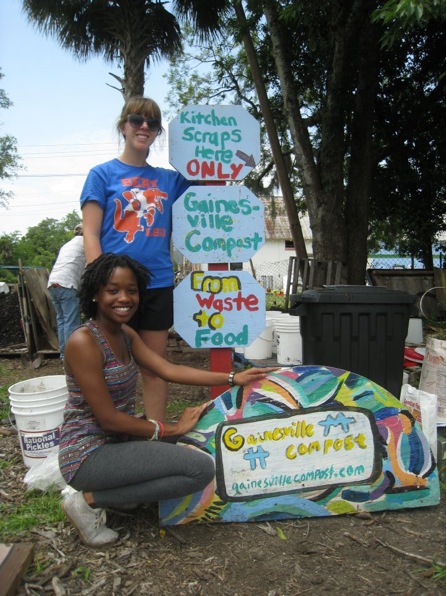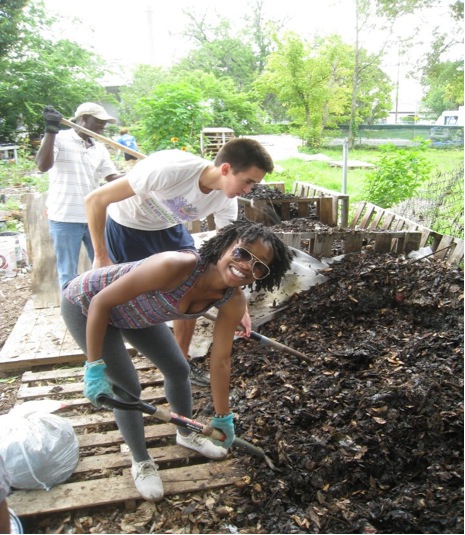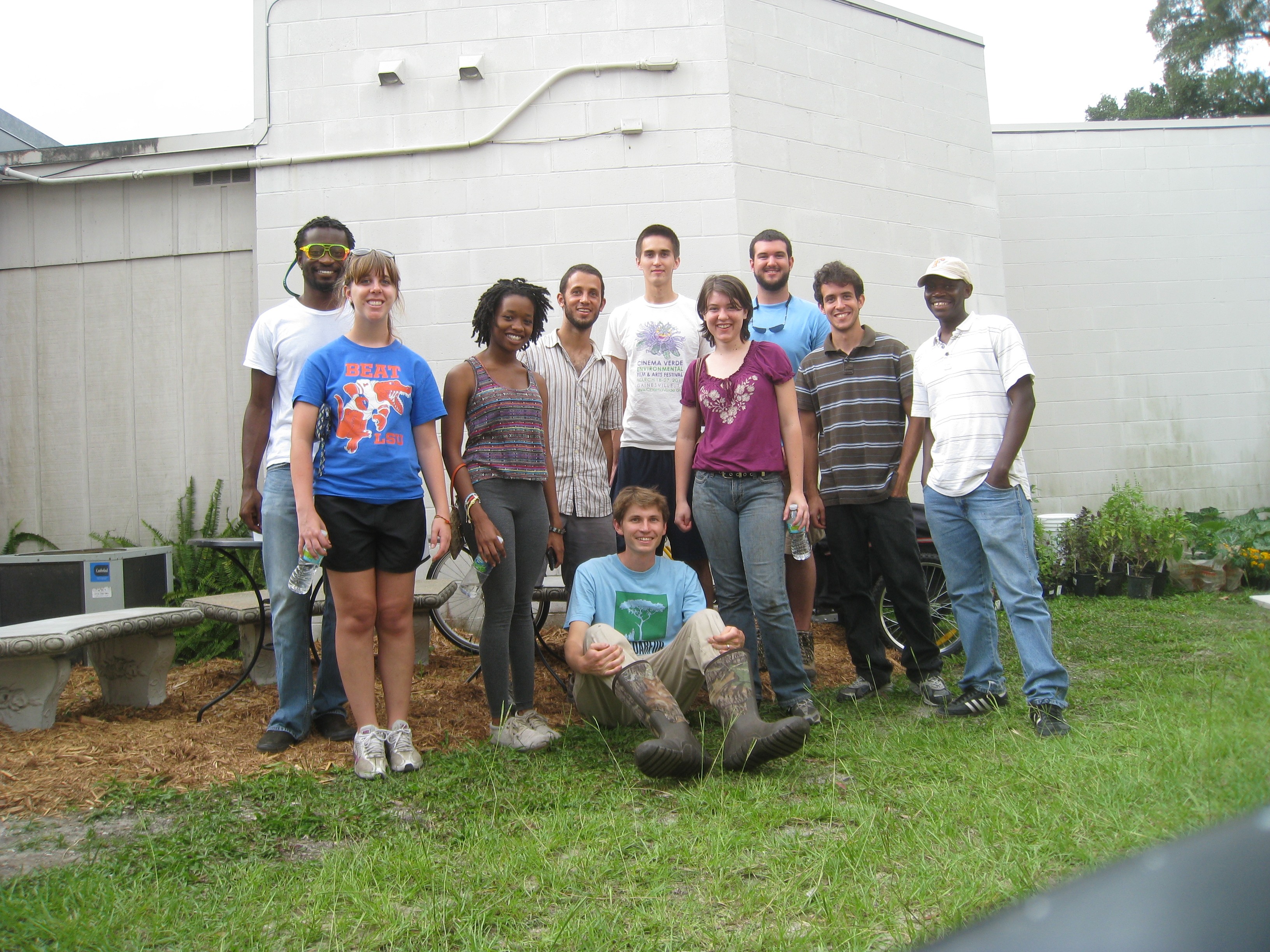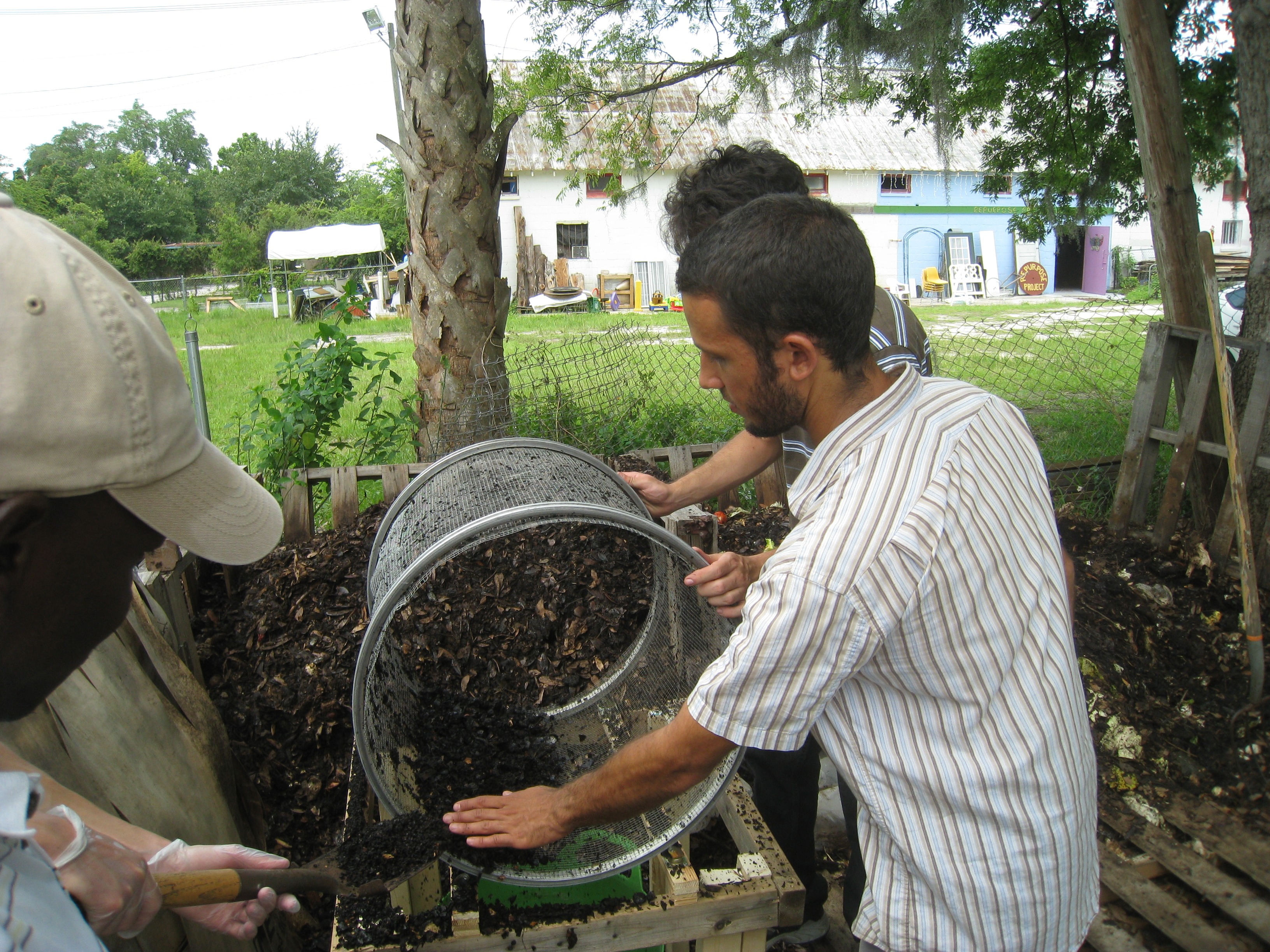Gainesville Compost and Repurpose Project
June 14, 2012
Ocala, FL
Author: Leslie Johnson
Website

Gainesville Compost is a local compost business created by Chris Cano. The business is a bicycle-powered food waste collection and composting service serving primarily local restaurants and cafes. The food scraps usually contain mostly food preparation wastes; such as vegetable matter, fruits, coffee grinds, egg shells, etc. Currently, Gainesville Compost has several small composting areas. We visited the most active compost site of Gainesville Compost located at the Church of Holy Colors (CHC), a locally run art and music studio. Within the area two local community projects are underway: the Repurpose Project and the Citizens Co-op grocery store. The purpose of this field trip was for the interns to get a visual understanding of how a small-scale commercial compost facility is operated. Gainesville Compost uses a three-stage pile system at the CHC site. This method of composting is the easiest way for Chris to manage the high load of food waste he is currently receiving from area restaurants.
The BESS interns observed and measured the temperatures of the compost. During the first stage of composting, the pile usually hits a peak temperature between 145°F-155°F. At this stage the compost is steaming from the activity of the microbes. When it cools down, Chris uses a pitchfork to move it to the second stage. The temperature peaks around 110° F in the second stage and around 90°F in the third stage. A few of the tasks that we helped Chris with were: repairing the final stage sifter for separating the finished compost product, weighing and emptying food waste into the compost pile, painting signs for compost piles and containers, and fertilizing the garden with finished compost.

To begin, we noticed the sifter was not working properly because one of its legs was broken off. The issue was the compost kept falling out of the sides and dropping to the ground. Chris’ goal for the sifter was to possibly load it on one side while all the fine particles fell through. The interns repaired the sifter at the Repurpose Project with the help of its director Mike Meyers. We used old boards to filter the compost into the container so very little of it was dropping to the ground. I believe emptying and transferring the food waste was the most challenging task of them all. Some of the five gallon buckets of food waste weighed up to 30 pounds. There was a discussion about possibly using a pulley system to empty the buckets into the compost pile. The materials needed for this could be attained from the Repurpose Project.
After loading the compost pile, we turned and transferred parts of the compost pile. We also gathered leaves and watered the compost. Chris has a ratio system for the first stage of compost; for every two buckets of food scraps he adds a bucket of leaves for an additional carbon source. Also, we painted new signs for the compost containers. The paint was provided to us from CHC. The paint was unused paint from the Alachua County Hazardous Waste Collection Center (a future field trip). Finally, fertilizing the garden was relaxing and did not require as much energy.

This fieldtrip illustrates community sustainability because of the recycling/reusing of nutrients and materials. Composting is a natural biological process that recycles the nutrients from food waste and uses it as a fertilizer to grow more food. The Repurpose Project provided us with used materials that were donated to them. These materials could have been thrown away instead of being reused to serve a different purpose. These actions are sustainable because they are using things we already have access to more efficiently. The trip also allowed us to go to an organic market and the restaurant Bistro-To-Go. It was interesting to learn of the local restaurants that are practicing sustainability. Bistro-To-Go composts their food waste with Gainesville Compost and has a small garden and courtyard in the back of the restaurant where they grow fruits, vegetables, and flowers.
Overall, we spent majority of our day at the Church of Holy Colors with Chris Cano and Mike Meyers. The most rewarding part of the trip was Chris’ excitement and seeing the progress we made with only a few hours of work. We helped complete several tasks that Chris appreciated and would help in his overall composting operation. We also have a much better idea of the new composters Chris would like to have on site at CHC. When building these new composters, we have to keep Chris’ vision in mind because not only are we gaining experience in building composters, but also we are helping out and supporting a local businessman. The trip taught us about the portion of the Gainesville community that is knowledgeable about composting. People do not mind contributing to composting as long as it remains simple. The people in the community can come to CHC and drop off their food waste in the designated bins. I am sure more people would be willing to support the sustainable actions of Gainesville compost if they were aware of its existence. Gainesville Compost is a company helping Gainesville to become more aware and sustainable.
